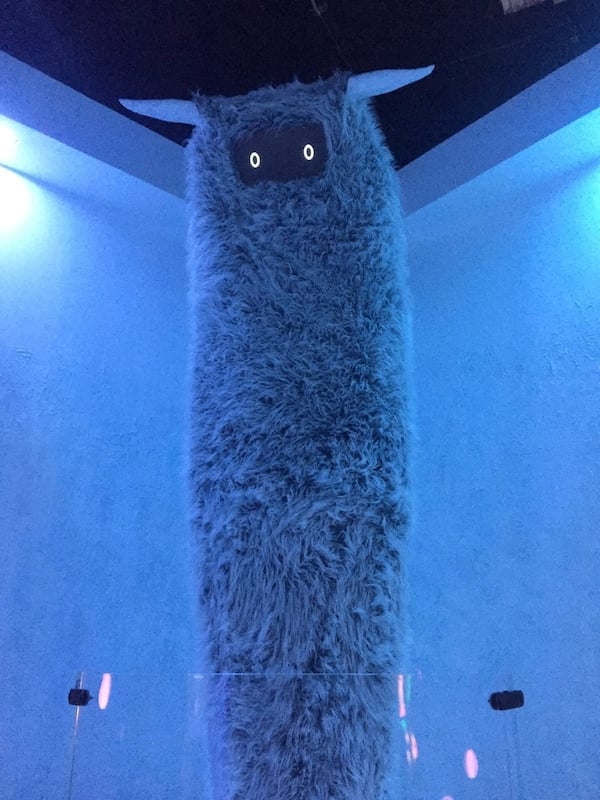
One of the artists behind the wildly popular Santa Fe art space run by the art production company Meow Wolf has filed a lawsuit against the corporation for allegedly violating her copyright.
Lauren Adele Oliver claims that her piece, Space Owl, helped Meow Wolf become a multi-million dollar enterprise, but that she hasn’t been properly credited or remunerated. In her lawsuit, she says the company pressured her by offering her two options: selling the rights to the character for a pittance, or taking it out of the exhibition without any additional payment.
Oliver just wants to be “compensated fairly,” her lawyer, Jesse A. Boyd, told the Santa Fe New Mexican. She is seeking more than $1 million.
Lauren Adele Oliver’s Space Owl at Meow Wolf’s “House of Eternal Return.” Photo by Gabriella Marks.
Oliver made her first sketches of Space Owl in 2006, and created a seven-foot sculpture of the design for a gallery show in Santa Fe. Representatives from Meow Wolf, who allegedly first saw the work there, asked Oliver to include it in House of Eternal Return, their Santa Fe space, and Oliver agreed.
Oliver says she and other artists were told they now were part of the Meow Wolf collective, and that if House of Eternal Return became profitable, they would get an “artist revenue share.”
The exhibition opened in 2016 and quickly became a huge hit, and Oliver believes her prominently displayed artwork was an important component of that success.
“The Space Owl put a friendly face on this new, weird, sometimes intimidating art experiment,” the lawsuit says, and became “a highly recognizable, iconic element of the exhibit.”
(The complaint also cites Artnet News’s list of the 100 defining works of the decade, which uses an image of Space Owl to illustrate House of Eternal Return, ranked at number 25.)
Lauren Adele Oliver, Space Owl (2006). Courtesy of the artist.
Oliver alleges that the revenue-sharing system was later renamed a “bonus program,” and that she became especially concerned about her lack of a formal agreement with Meow Wolf after Space Owl was featured in coloring books and other merchandise.
When Oliver raised her concerns in 2018, Meow Wolf allegedly offered a royalty-free licensing agreement to use the work, which she says she rejected. After she asked the company not to use Space Owl from promotional purposes until an agreement was in place, she learned it was prominently featured in the trailer for Meow Wolf’s self-made documentary.
Last June, Oliver met with Meow Wolf cofounder and chief executive Vince Kadlubek, who she says gave her the choice of a “nominal” one-time payment to keep Space Owl on display, or for the work to be removed from display with no additional compensation.
Oliver says she has only been received $2,000 for her work, which is less than she claims it cost to produce and install the piece. Meow Wolf, meanwhile, raised $158 million to expand its footprint across the US last year.
A spokesperson for Meow Wolf told Artnet News that the company is “disappointed by these baseless allegations.”
“Meow Wolf is committed to supporting artists and providing fair treatment to every person we collaborate with. These claims run completely counter to our culture and we will vigorously defend against them through the legal process.”